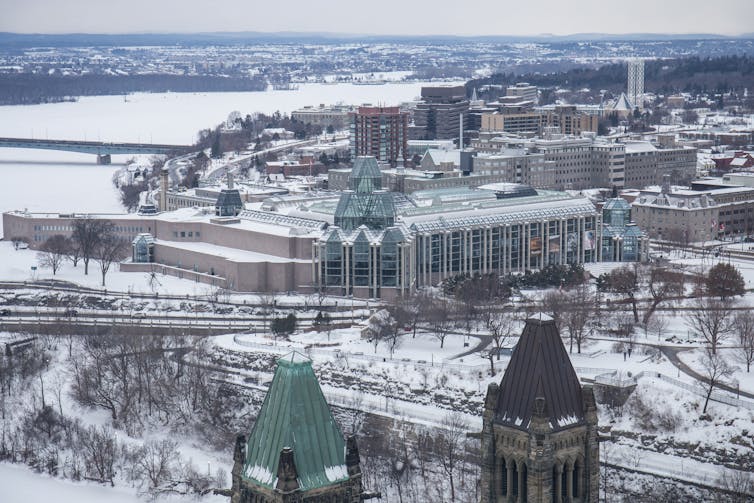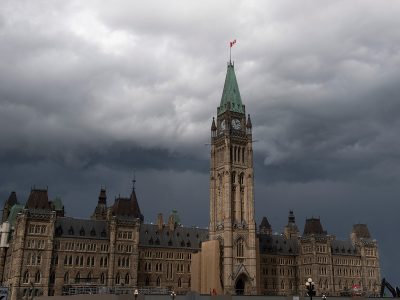Lead image by Shutterstock
By Shawn Kenny
This article is republished from The Conversation under a Creative Commons licence. All photos provided by The Conversation from various sources.
Rideau Canal Skateway, the 7.8 kilometre ice path winding through the Canadian capital city of Ottawa, is a National Historic Site of Canada and a UNESCO World Heritage Site.
This winter, for the first time, the Rideau Canal Skateway did not open.
Although transforming the Rideau Canal waterway into the winter skateway — which typically welcomes more than 21,000 visitors on average per day — requires considerable engineering and logistical effort, the ice cover growth is ultimately governed by the ambient environmental conditions.
Even if we achieve our global commitment to limit temperature increase to less than 2 C this century, climate change will continue to impact this culturally significant Canadian heritage site. Global warming is known to impact our ecosystems, biodiversity, food security and infrastructure.
Recent studies have observed decreases in the seasonal duration and area coverage of lake and river ice, with long-term negative impacts projected for recreational facilities.
And while the National Capital Commission (NCC) has been working towards advancing sustainable adaptation strategies that promote the resilience of such climate change-impacted areas, it needs to be supported with informed decision-making. Our research at Carleton University, in collaboration with the NCC, will establish an adaptive framework to support this strategy.
Effects of the changing climate
Since 1971, the average Rideau Canal Skateway season lasted 57 days. Over the past five seasons (2017-22) the average season length dropped down to 47 days. The longest season of 90 days took place in the winter of 1971-72, while the shortest season lasted 29 days in 2021-22. However, last winter, the full 7.8 kilometre stretch of the Skateway was accessible on opening day (Jan. 14, 2022) for the first time in over two decades.
This winter, the Rideau Canal Skateway never opened. This can be attributed to warmer temperatures and twice the typical snowfall when compared with the climate normal from 1981-2010.
Meanwhile, Ottawa-Gatineau’s Winterlude festival was delayed by one day due to extreme cold conditions with a mean temperature of -26 C and average windchill of -34 C on Feb. 4, 2023. This was despite the region experiencing warmer than normal temperatures in 2022-23.
These erratic weather patterns, occurring due to climate change, may become a more significant factor affecting the season start and ice-building processes in the future.
Sustainable development strategy
The National Capital Commission, in collaboration with local municipalities and government agencies, established a sustainable development strategy to evaluate the risk of climate change effects on infrastructure and heritage buildings, natural resources and parks.
This adaptation strategy has three phases: 1) climate projections, 2) vulnerability and risk assessment and 3) adaptation strategy.

One of the key findings of the first phase is that, in a high emission scenario, winters in the Ottawa region would be five weeks shorter by 2050 with 35 per cent fewer days below -10 C. The climate projections also estimated a decrease in annual snowfall by 20 per cent with an increase in freezing rain.
An outcome from the second phase was to address the climate hazards impacting infrastructure, heritage buildings, natural resources and parks, like the Rideau Canal Skateway, and advance possible adaptation strategies.
Multi-disciplinary approach
The National Capital Commission teamed up with Carleton University to develop an improved understanding of the climate-related hazards and find potential adaptation strategies to mitigate the effect of climate change and make the Rideau Canal Skateway more resilient.
The multidisciplinary team at Carleton has integrated researchers across the fields of physical geography, cryospheric science, civil and mechanical engineering and remote sensing. In collaboration with the NCC, we have begun a four-year research project with this goal in mind.
This project aims to:
1) improve our knowledge base on the physical environment of the Rideau Canal Skateway
2) use this data to simulate the effects of climate change projected forward over the next 10, 20 and 30 year periods
3) assess what makes the Skateway vulnerable to the effects of climate change
4) conduct pilot studies to evaluate possible adaptation strategies
5) refine and optimize the promising adaptation strategies that can help address the uncertain evolution of climate change in the future
We will explore what promotes ice growth at the beginning of the season when the environmental conditions are more favourable and the ice cover is too thin for supporting conventional equipment and techniques.
The initial pilot studies will focus on the use of snow fans or slush canons to promote ice growth (ice catching), reduced scale autonomous snow blowers (snow management) and heat exchangers, such as thermosyphons, that help cool the water below the ice (thermal management).
A dynamic pathway based on these studies will help the National Capital Commission to implement effective and sustainable adaptation strategies that maintain or improve the current levels of service for the next 30-year window.
Broader view with global action
The iconic significance of the Rideau Canal Skateway makes it an integral part of Ottawa’s cultural identity and our project aims to find climate change adaptation strategies to keep this intact.
Underpinning this research is the overarching need for a concerted global community response to the challenges of climate change.
Such challenges also present opportunities like economic growth and technology development in the energy transition market, which in turn has other benefits ranging from improved public health to job creation. Leveraging these benefits of climate action can become the cornerstone of our climate change adaptation strategies.
![]()
Friday, March 17, 2023 in The Conversation
Share: Twitter, Facebook



